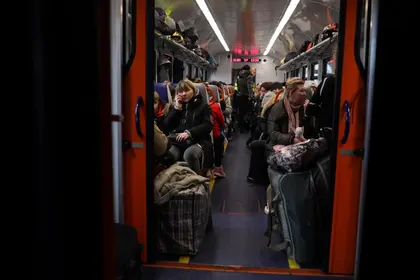The word “justice” has been on the lips of many Ukrainians over the last 11 months of war. People are looking for it and people are demanding it. We have come to understand that justice is what all Ukrainians dream of. But, as it would transpire, that is not always the case.
While Ukraine has become a byword for courage and determination, Ukrainians have a choice as to how they might categorize their various compatriots – with heroes and traitors being two common and distinct terms,
JOIN US ON TELEGRAM
Follow our coverage of the war on the @Kyivpost_official.
Heroes are clear for all to see – the soldiers and medics at, or near, the front, as well as volunteers working hard so that the Ukrainian army is better armed and better equipped, with enough vehicles and drones to do the job.
Traitors are also easy to identify – such as officials and even former deputies of regional councils, and even members of the national parliament who have turned out to be Russian agents and helped the Kremlin to prepare for its operation to seize Ukraine.
Volodymyr Saldo, a former member of Ukraine’s parliament, might be considered an outstanding anti-hero amongst traitors. In February 2022, Saldo was the mayor of Kherson city. When Russian occupation came to Kherson, he was immediately appointed as head of the Civil-Military Administration for the region.
Since the beginning of October, Saldo has been acting as the Russian Governor of Kherson region. In the Russian language version of Wikipedia, he is described as a “Ukrainian and Russian politician and statesman.” He was one of the first Kherson residents to receive a Russian passport, and shortly afterwards, Russian President Vladimir Putin bestowed on him the Russian Order of Merit for services to the Fatherland.

EXPLAINED: What We Know About Russia’s Oreshnik Missile Fired on Ukraine
While every Ukrainian has their own understanding of justice, where Putin is concerned, Ukrainians are virtually unanimous in seeing him as a war criminal who should go on trial at the international court in The Hague. But that stroke of justice is for the future and is most likely some way off. Putin, along with others such as Russian oligarch Yevgeny Prigozhin and Chechen Republic head Ramzan Kadyrov, will all be dealt with when the time comes.
However, for now, there is another debate to be had regarding how Ukrainians perceive the words and actions of others. Some citizens who have remained in the country, are critical of those who went abroad as refugees. Similarly, and among refugees who have left the country, there is criticism of those they consider to have behaved inappropriately, for example continuing to speak Russian instead of Ukrainian.
On the issue of males seeking to leave Ukraine
Ukrainian refugee women appear to react most sharply to draft-age male refugees. The topic of male refugees also worries many who remain in Ukraine. According to the terms of Ukraine’s marshal law, only men citizens over 60, along with men who fall into very specific categories have the right to leave the country. This includes men with disabilities, fathers of three or more children, and sole carers of ill or disabled people.
It is true that some men of conscription age try to leave Ukraine illegally, but few have recently succeeded. In the past 12 months, border guards have put a stop to more than 12,000 attempts to leave the country illegally, be it with fake documents, in car trunks, and across mountains, forests, and rivers using illegal guides.
At least 15 Ukrainian men have died trying to get abroad in this way. Recently, Romanian border guards found yet another body of a drowned Ukrainian man on their bank of the Tisza River along the border with Ukraine.
There is another category of men of conscription age which attracts the attention of vigilant Ukrainian refugees. We are talking here about men from the Russian-occupied parts of the Donbas and south of the country, who initially traveled to Russia and then through Estonia, Latvia, Georgia or Turkey, to reach Poland, the Czech Republic, or other European countries, where they were registered as refugees.
In Poland, for example, Ukrainian refugees are often accommodated together in hotels or hostels. Ukrainian refugees follow developments at home very closely, especially news from their own regions. They discuss events passionately – always looking for signs that the war will end soon. Now and again, it becomes evident that certain refugees who left through Russia still retain pro-Russian or, at least, anti-Kyiv sentiments.
This leads to noisy disputes. Patriotically minded refugees petition the local authorities to evict the "traitors", or at least to resettle them somewhere else. Polish and Czech officials have been left unnerved by the situation. They expected all Ukrainians to be united in their attitude to their homeland and to Russian aggression.
As I understand it, conflicts between pro and anti-Kyiv Ukrainians are not widespread, but in Europe, where justice demands that all refugees be treated equally, an increase in the number of less patriotic Ukrainians could turn into a serious challenge.
You can also highlight the text and press Ctrl + Enter






